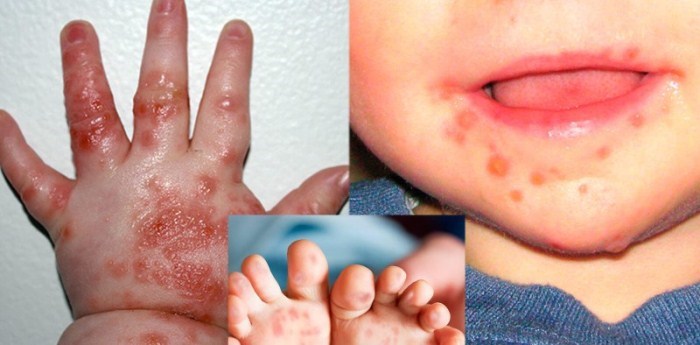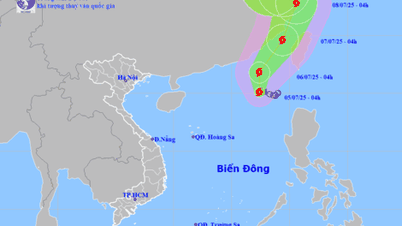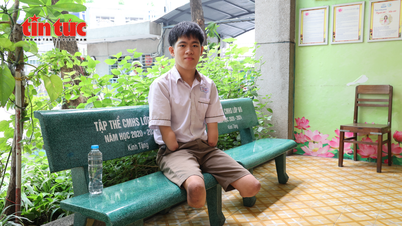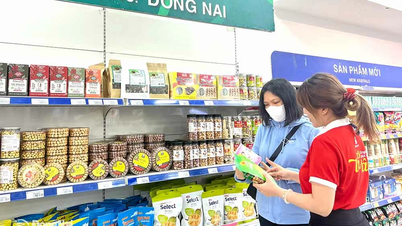Some signs of hand, foot and mouth disease include mouth ulcers, gums, tongue, blisters on the palms of the hands, soles of the feet...
According to the infectious disease surveillance report of 20 provinces/cities in the Southern region, by week 20 of 2023, 5,765 cases of hand, foot, and mouth disease had been recorded and have been increasing since week 18, including 1 death.
In Tay Ninh , in week 21 of 2023, the number of hand, foot and mouth disease cases increased slightly in Chau Thanh, Hoa Thanh districts and Tay Ninh city; cumulatively by the end of week 21 of 2023, 74 cases of hand, foot and mouth disease were recorded in the whole province (29 cases in week 21 of 2023 alone).
The disease is common in children under 5 years old, especially those under 3 years old. Children are at higher risk of contracting the virus and getting sick because they have weaker immune systems and are less aware of disease prevention than adults. However, anyone who has never had the disease is at risk of infection when exposed to the source of infection. Group living factors such as children attending daycare centers and kindergartens are risk factors for disease transmission, especially during outbreaks.
The main symptoms of the disease are skin and mucous membrane lesions in the form of blisters in special locations such as the oral mucosa, palms, soles, buttocks, and knees. The disease can cause many dangerous complications such as encephalitis, meningitis, myocarditis, acute pulmonary edema leading to death if not detected early and treated promptly. Therefore, when children have hand, foot, and mouth disease, they should be kept home from school and avoid contact with other children in the family and neighbors. Monitor the symptoms and progression of the disease, especially warning signs of severe disease progression so that the child can be taken to the hospital promptly.
3 warning signs of serious illness
Children cry continuously for a long time: when suffering from hand, foot, and mouth disease, children may cry all night or wake up every 15-20 minutes and cry continuously. This is a warning sign of early stage neurotoxicity.
High fever that does not respond to treatment: Children have a fever above 38.5 degrees Celsius for more than 48 hours and do not respond to antipyretics.
Startled: This is a warning sign of neurotoxicity. Parents need to pay attention to how often their child is startled, even when they are playing.
Measures to prevent hand, foot and mouth disease
Currently, the weather in the Southern region in general and Tay Ninh province in particular is starting the rainy season, the temperature and humidity change, combined with the increased travel and summer activities of students, while the awareness and hygiene behavior of students is not high, which are favorable conditions for the outbreak and development of epidemics, especially diseases transmitted through the digestive tract such as hand, foot and mouth disease. To proactively prevent hand, foot and mouth disease, people and the community need to take the following measures:
Personal hygiene: Wash hands regularly with soap under running water many times a day (both adults and children), especially before preparing food, before eating/feeding children, before holding children, after using the toilet, after changing diapers and cleaning children.
Food hygiene: Children's food must be nutritious; cooked food and water must be boiled; eating and drinking utensils must be washed clean before use (preferably soaked in boiling water); use clean water in daily activities; do not feed children; do not let children eat with their hands, suck their fingers, or suck on toys; do not let children share napkins, handkerchiefs, eating and drinking utensils such as cups, bowls, plates, spoons, and toys that have not been sterilized.
Cleaning toys and living areas: Households, kindergartens, and home childcare centers need to regularly clean surfaces and objects that come into daily contact such as toys, learning tools, doorknobs, stair handrails, table/chair surfaces, and floors with soap or common detergents.
Collection and treatment of children's waste: Use hygienic toilets, children's feces and waste must be collected, treated and dumped into hygienic toilets.
Early detection monitoring: Regularly monitor your child's health. Do not let your child come into contact with sick or suspected sick people. When your child shows signs of suspected illness, take him or her to the doctor for examination and isolation, and treat him or her promptly according to the doctor's instructions to avoid spreading the disease to other children.
Dinh Tien
Source link



































































































Comment (0)